七下 Unit 11 How was your school trip? 单元复习知识点课件(共27张PPT)
文档属性
| 名称 | 七下 Unit 11 How was your school trip? 单元复习知识点课件(共27张PPT) | 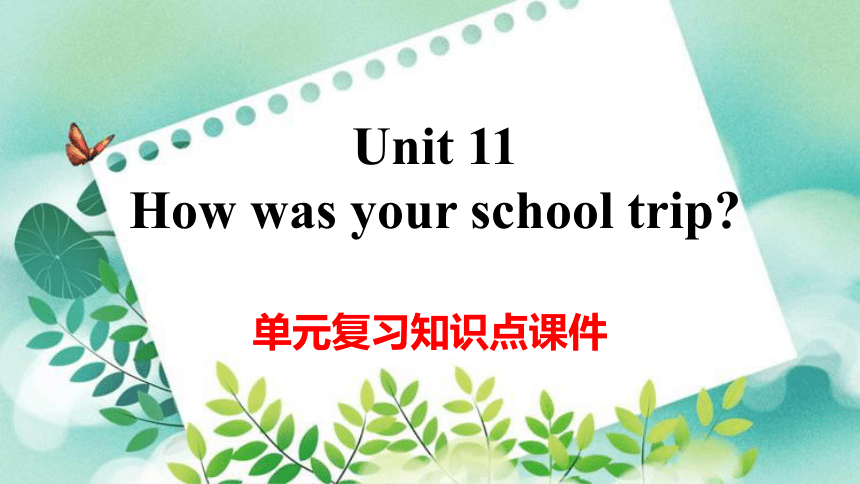 | |
| 格式 | pptx | ||
| 文件大小 | 216.0KB | ||
| 资源类型 | 教案 | ||
| 版本资源 | 人教新目标(Go for it)版 | ||
| 科目 | 英语 | ||
| 更新时间 | 2023-06-11 16:36:07 | ||
图片预览

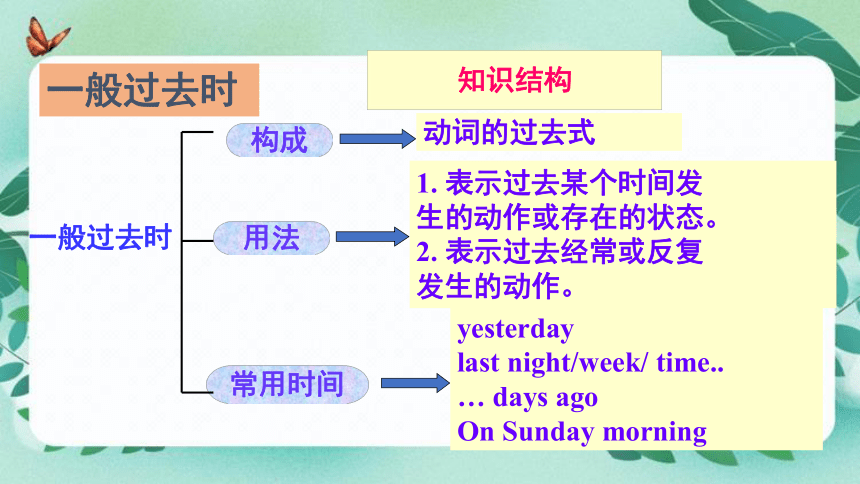
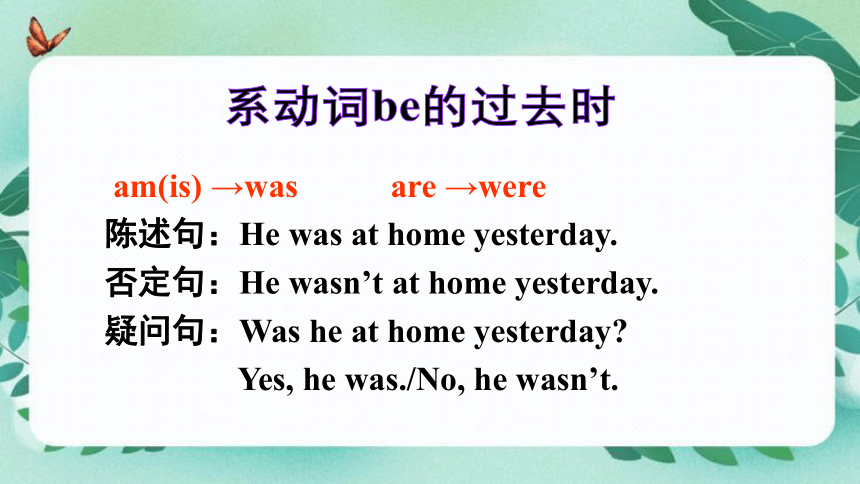
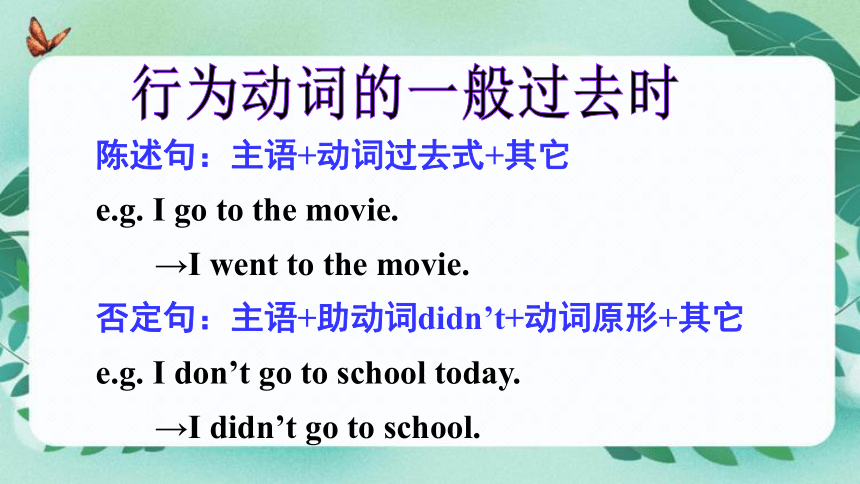
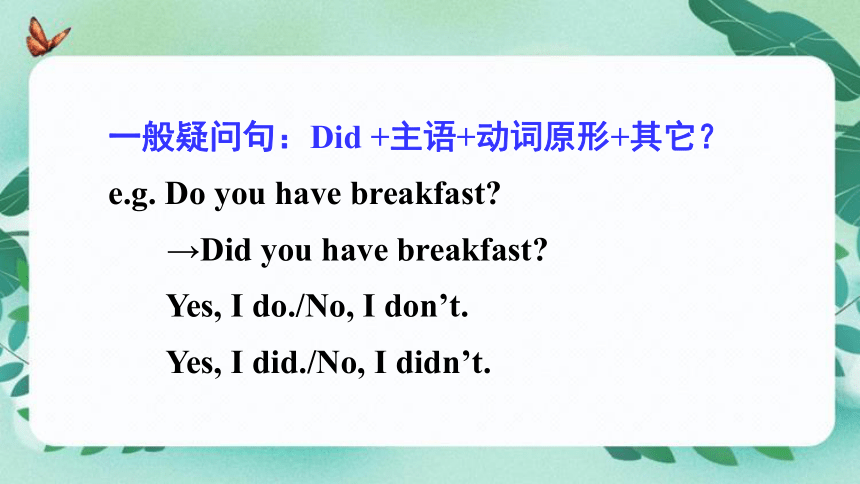
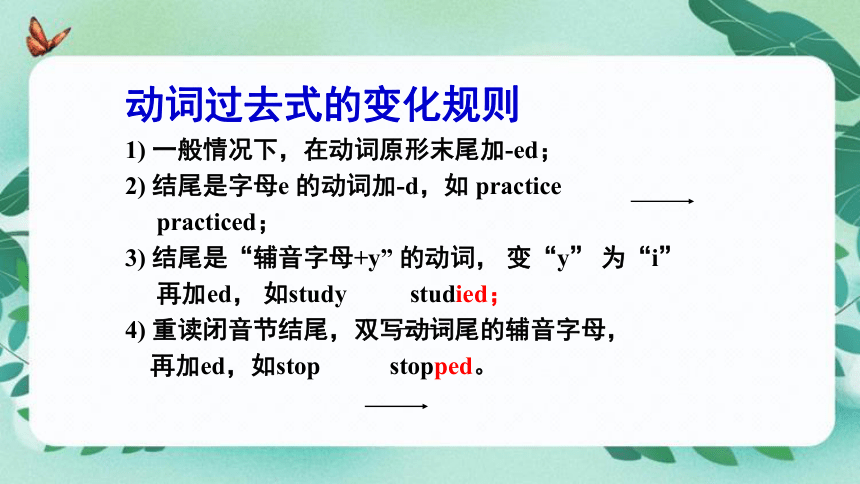
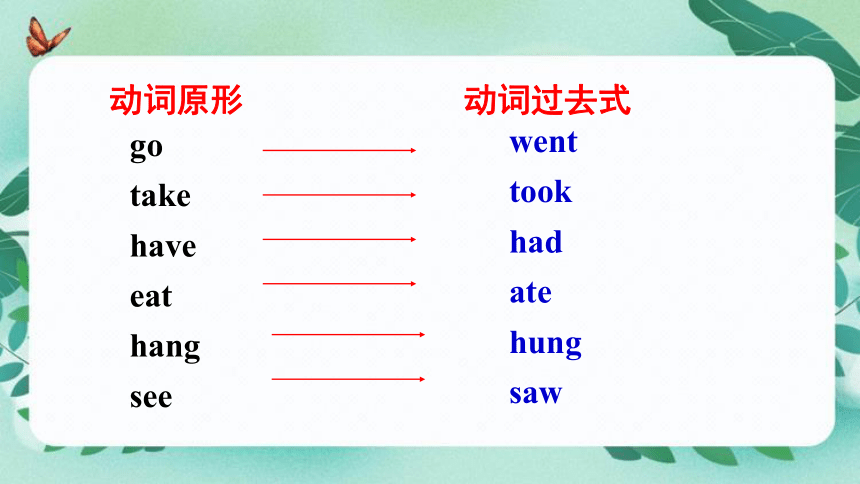
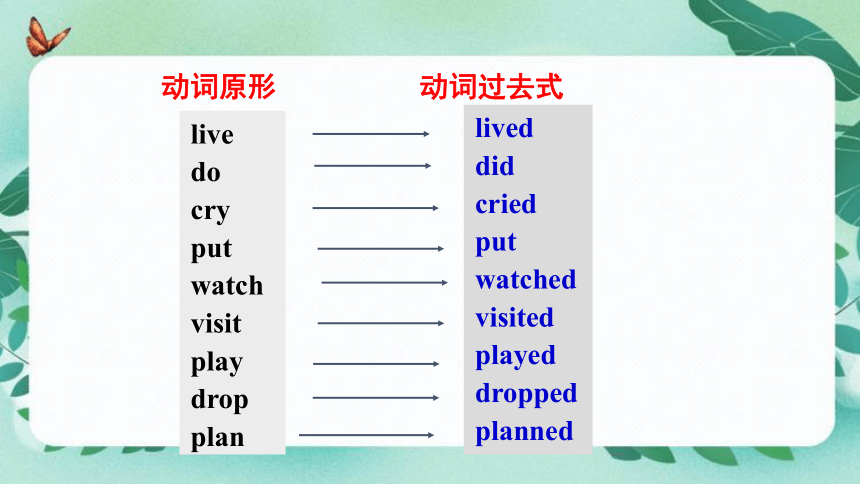
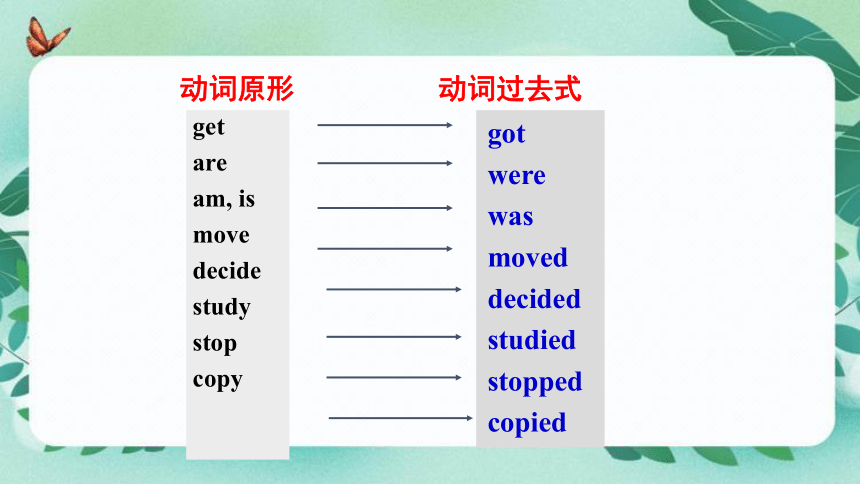
文档简介
(共27张PPT)
单元复习知识点课件
Unit 11
How was your school trip
知识结构
构成
用法
常用时间
动词的过去式
1. 表示过去某个时间发
生的动作或存在的状态。
2. 表示过去经常或反复
发生的动作。
yesterday
last night/week/ time..
… days ago
On Sunday morning
一般过去时
一般过去时
am(is) →was are →were
陈述句:He was at home yesterday.
否定句:He wasn’t at home yesterday.
疑问句:Was he at home yesterday
Yes, he was./No, he wasn’t.
系动词be的过去时
陈述句:主语+动词过去式+其它
e.g. I go to the movie.
→I went to the movie.
否定句:主语+助动词didn’t+动词原形+其它
e.g. I don’t go to school today.
→I didn’t go to school.
行为动词的一般过去时
一般疑问句:Did +主语+动词原形+其它?
e.g. Do you have breakfast
→Did you have breakfast
Yes, I do./No, I don’t.
Yes, I did./No, I didn’t.
1) 一般情况下,在动词原形末尾加-ed;
2) 结尾是字母e 的动词加-d,如 practice
practiced;
3) 结尾是“辅音字母+y” 的动词, 变“y” 为“i”
再加ed, 如study studied;
4) 重读闭音节结尾,双写动词尾的辅音字母,
再加ed,如stop stopped。
动词过去式的变化规则
go
take
have
eat
hang
see
went
took
had
ate
hung
saw
动词原形 动词过去式
动词原形 动词过去式
lived
did
cried
put
watched
visited
played
dropped
planned
live
do
cry
put
watch
visit
play
drop
plan
get
are
am, is
move
decide
study
stop
copy
got
were
was
moved
decided
studied
stopped
copied
动词原形 动词过去式
动词一般过去时,表示过去发生事;
be用was或用were, have, has变had;
谓语动词过去式,过去时间作标志;
一般动词加-ed,若是特殊得硬记。
否定句很简单,主语之后didn’t添;
疑问句也不难,did放在主语前;
如果谓语之前有did,谓语动词需还原;
动词若是was,were,否定就把not添。
巧记一般过去时
Ⅰ. 用括号内所给动词的适当形式填空。
1. They ______(come) to China two
months ago.
2. Where ______(be) she last week
3. The twins ______(be) at school this morning.
4. ______ he ______ (tell) you a story last Sunday
came
was
were
Did tell
Exercises
5. We ____________ (not watch) TV last night.
6. Let me ______ (help) you.
7. Listen! Sue ___________ (sing) an English song.
8. Tom always ______ (get) up at six o’clock
in the morning.
9. _____________ (not close) the door.
didn’t watch
help
is singing
gets
Don’t close
Ⅱ.按要求完成句子,每空一词。
1. My school trip was great. (对划线部分提问)
_____ _____ your school trip
2. Mr. Smith goes to the park every day.
(用yesterday改写句子)
Mr. Smith _____to the park ____________.
3. It was windy yesterday. (改为一般疑问句)
______ ____windy yesterday
How was
went
yesterday
Was it
4. They had a good time at the party.
(改为同义句)
They ________ ________ at the party.
5. Jack watched a basketball game last
night. (对划线部分提问)
______ _____ Jack ____last night
had fun
What did
do
quiet a lot 相当多+of+可数或不可数,也可以单独使用。
quite a little 相当多+不可数名词
quite a few 相当多+可数名词
1. -Did you see any cows
-Yes, I did. I saw quite a lot.
Language points
e.g. 我看到了相当多的奶牛。
I saw quite a lot of cows.
夏天我经常打网球。
I play tennis quite a lot in the summer.
不少学生迟到了。
Quite a few students were late.
take与photo, picture等词搭配时,表示
“拍摄,摄影”。表示“拍摄某物或人”,
就要在短语后面接介词“of” 引入所拍摄
的对象。
e.g. The girl likes to take photos of herself
with her cell phone.
2. Did Carol take any photos
卡罗尔拍照片了吗?
3.I visited my grandparents in the countryside.
我去看望了乡下的爷爷奶奶。
a) visit 表示“拜访,看望,参观”,后面宾语
可以是人,也可以是地点名词。
e.g. visit my teacher = call on my teacher
visit your school = call at your school
b) in the countryside 在乡下
countryside在此处等同于country,
都是“乡下,农村”之意,往往和
冠词 “the” 搭配连用。
e.g. We spent a pleasant day in the country.
我们在乡下度过了愉快的一天。
4. I fed the chickens with my grandpa.
我和祖父一起给鸡喂食。
“ feed … with …”词组表示“用……
喂……;和……去喂……”, 此时等于
“feed … on …” ,短语中feed是及物动词,
其后接人或动物名词作宾语。
e.g. A kid fed the monkey on/with a banana.
那个小孩用香蕉喂猴子。
短语feed on 中的feed为不及物动词,意思
是“以……为食,靠……为生”,其主语主
要用来指动物,也可用于指婴儿,其宾语
通常是食物或饲料名词,此时等同于live on。
e.g. Cattle feed mostly on grass.
牛以草为主食。
5. Sounds good. 听起来不错!
此处sound为系动词,表示听起来……
其后加形容词。同样用法的
单词还有feel, taste, smell,look 等,
表示“摸/尝/闻/看起来”。
e.g. This coat feels soft. 这件上衣摸起来很软。
The supper smells delicious.
晚饭闻起来很香。
fun表示“有趣的事情”,为不可数名词。
e.g. Look, Peter. The children are having
so much fun.
6. It was so much fun.
7. Lucky you! 你真幸运!
这是一句非正式口语,相当于You’re so lucky.
Lucky之后的人称还可以改为me, him。
8. All in all, it was an exciting day.
总之,这是令人兴奋的一天。
all in all 总的说来;总之;整体上说
e.g. All in all, I think you did a good job.
总的说来,我认为你干得很好。
All in all, it was a great success.
总之,是很成功的。
9. Everything was about robots and I’m
not interested in that.
be interested in 对……感兴趣
e.g. They want to be interested in what they
are doing. 他们总希望对正在做着的事
充满浓厚兴趣。
他对画画很有兴趣。
He is interested in painting.
10. I didn’t like the trip at all.
我一点都不喜欢这次行程。
not at all/not…at all相当于“根本不;完全不”。
e.g. I don’t like mutton at all.
我完全不喜欢羊肉。
She’s not at all good at badminton.
她完全不擅长打羽毛球。
我一点也不喜欢物理。
I don’t like physics at all.
Yesterday was my birthday. My mother had a party for me. She________my friends to my home. They_____me many beautiful gifts. The party
_________at half past six. There ______ cold drinks and a delicious cake. We_________, talked and____. We_____a wonderful time.
用方框中所给单词的适当形式填空。
eat have are laugh invite starte give
invited
gave
started
were
laughed
ate
had
单元复习知识点课件
Unit 11
How was your school trip
知识结构
构成
用法
常用时间
动词的过去式
1. 表示过去某个时间发
生的动作或存在的状态。
2. 表示过去经常或反复
发生的动作。
yesterday
last night/week/ time..
… days ago
On Sunday morning
一般过去时
一般过去时
am(is) →was are →were
陈述句:He was at home yesterday.
否定句:He wasn’t at home yesterday.
疑问句:Was he at home yesterday
Yes, he was./No, he wasn’t.
系动词be的过去时
陈述句:主语+动词过去式+其它
e.g. I go to the movie.
→I went to the movie.
否定句:主语+助动词didn’t+动词原形+其它
e.g. I don’t go to school today.
→I didn’t go to school.
行为动词的一般过去时
一般疑问句:Did +主语+动词原形+其它?
e.g. Do you have breakfast
→Did you have breakfast
Yes, I do./No, I don’t.
Yes, I did./No, I didn’t.
1) 一般情况下,在动词原形末尾加-ed;
2) 结尾是字母e 的动词加-d,如 practice
practiced;
3) 结尾是“辅音字母+y” 的动词, 变“y” 为“i”
再加ed, 如study studied;
4) 重读闭音节结尾,双写动词尾的辅音字母,
再加ed,如stop stopped。
动词过去式的变化规则
go
take
have
eat
hang
see
went
took
had
ate
hung
saw
动词原形 动词过去式
动词原形 动词过去式
lived
did
cried
put
watched
visited
played
dropped
planned
live
do
cry
put
watch
visit
play
drop
plan
get
are
am, is
move
decide
study
stop
copy
got
were
was
moved
decided
studied
stopped
copied
动词原形 动词过去式
动词一般过去时,表示过去发生事;
be用was或用were, have, has变had;
谓语动词过去式,过去时间作标志;
一般动词加-ed,若是特殊得硬记。
否定句很简单,主语之后didn’t添;
疑问句也不难,did放在主语前;
如果谓语之前有did,谓语动词需还原;
动词若是was,were,否定就把not添。
巧记一般过去时
Ⅰ. 用括号内所给动词的适当形式填空。
1. They ______(come) to China two
months ago.
2. Where ______(be) she last week
3. The twins ______(be) at school this morning.
4. ______ he ______ (tell) you a story last Sunday
came
was
were
Did tell
Exercises
5. We ____________ (not watch) TV last night.
6. Let me ______ (help) you.
7. Listen! Sue ___________ (sing) an English song.
8. Tom always ______ (get) up at six o’clock
in the morning.
9. _____________ (not close) the door.
didn’t watch
help
is singing
gets
Don’t close
Ⅱ.按要求完成句子,每空一词。
1. My school trip was great. (对划线部分提问)
_____ _____ your school trip
2. Mr. Smith goes to the park every day.
(用yesterday改写句子)
Mr. Smith _____to the park ____________.
3. It was windy yesterday. (改为一般疑问句)
______ ____windy yesterday
How was
went
yesterday
Was it
4. They had a good time at the party.
(改为同义句)
They ________ ________ at the party.
5. Jack watched a basketball game last
night. (对划线部分提问)
______ _____ Jack ____last night
had fun
What did
do
quiet a lot 相当多+of+可数或不可数,也可以单独使用。
quite a little 相当多+不可数名词
quite a few 相当多+可数名词
1. -Did you see any cows
-Yes, I did. I saw quite a lot.
Language points
e.g. 我看到了相当多的奶牛。
I saw quite a lot of cows.
夏天我经常打网球。
I play tennis quite a lot in the summer.
不少学生迟到了。
Quite a few students were late.
take与photo, picture等词搭配时,表示
“拍摄,摄影”。表示“拍摄某物或人”,
就要在短语后面接介词“of” 引入所拍摄
的对象。
e.g. The girl likes to take photos of herself
with her cell phone.
2. Did Carol take any photos
卡罗尔拍照片了吗?
3.I visited my grandparents in the countryside.
我去看望了乡下的爷爷奶奶。
a) visit 表示“拜访,看望,参观”,后面宾语
可以是人,也可以是地点名词。
e.g. visit my teacher = call on my teacher
visit your school = call at your school
b) in the countryside 在乡下
countryside在此处等同于country,
都是“乡下,农村”之意,往往和
冠词 “the” 搭配连用。
e.g. We spent a pleasant day in the country.
我们在乡下度过了愉快的一天。
4. I fed the chickens with my grandpa.
我和祖父一起给鸡喂食。
“ feed … with …”词组表示“用……
喂……;和……去喂……”, 此时等于
“feed … on …” ,短语中feed是及物动词,
其后接人或动物名词作宾语。
e.g. A kid fed the monkey on/with a banana.
那个小孩用香蕉喂猴子。
短语feed on 中的feed为不及物动词,意思
是“以……为食,靠……为生”,其主语主
要用来指动物,也可用于指婴儿,其宾语
通常是食物或饲料名词,此时等同于live on。
e.g. Cattle feed mostly on grass.
牛以草为主食。
5. Sounds good. 听起来不错!
此处sound为系动词,表示听起来……
其后加形容词。同样用法的
单词还有feel, taste, smell,look 等,
表示“摸/尝/闻/看起来”。
e.g. This coat feels soft. 这件上衣摸起来很软。
The supper smells delicious.
晚饭闻起来很香。
fun表示“有趣的事情”,为不可数名词。
e.g. Look, Peter. The children are having
so much fun.
6. It was so much fun.
7. Lucky you! 你真幸运!
这是一句非正式口语,相当于You’re so lucky.
Lucky之后的人称还可以改为me, him。
8. All in all, it was an exciting day.
总之,这是令人兴奋的一天。
all in all 总的说来;总之;整体上说
e.g. All in all, I think you did a good job.
总的说来,我认为你干得很好。
All in all, it was a great success.
总之,是很成功的。
9. Everything was about robots and I’m
not interested in that.
be interested in 对……感兴趣
e.g. They want to be interested in what they
are doing. 他们总希望对正在做着的事
充满浓厚兴趣。
他对画画很有兴趣。
He is interested in painting.
10. I didn’t like the trip at all.
我一点都不喜欢这次行程。
not at all/not…at all相当于“根本不;完全不”。
e.g. I don’t like mutton at all.
我完全不喜欢羊肉。
She’s not at all good at badminton.
她完全不擅长打羽毛球。
我一点也不喜欢物理。
I don’t like physics at all.
Yesterday was my birthday. My mother had a party for me. She________my friends to my home. They_____me many beautiful gifts. The party
_________at half past six. There ______ cold drinks and a delicious cake. We_________, talked and____. We_____a wonderful time.
用方框中所给单词的适当形式填空。
eat have are laugh invite starte give
invited
gave
started
were
laughed
ate
had
同课章节目录
- Unit 1 Can you play the guitar?
- Section A
- Section B
- Unit 2 What time do you go to school?
- Section A
- Section B
- Unit 3 How do you get to school?
- Section A
- Section B
- Unit 4 Don't eat in class.
- Section A
- Section B
- Unit 5 Why do you like pandas?
- Section A
- Section B
- Unit 6 I'm watching TV.
- Section A
- Section B
- Review of Units 1-6
- Unit 7 It's raining!
- Section A
- Section B
- Unit 8 Is there a post office near here?
- Section A
- Section B
- Unit 9 What does he look like?
- Section A
- Section B
- Unit 10 I'd like some noodles.
- Section A
- Section B
- Unit 11 How was your school trip?
- Section A
- Section B
- Unit 12 What did you do last weekend?
- Section A
- Section B
